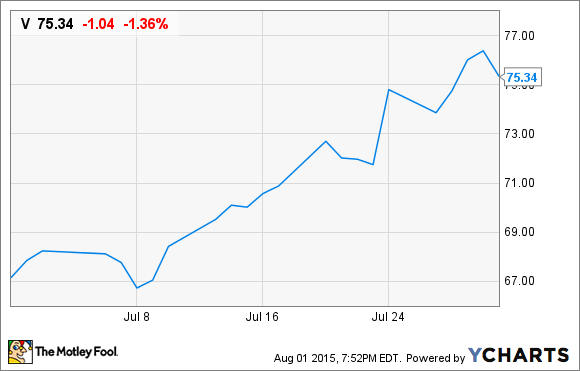Shares of electronic payment processing giant Visa (V 0.95%) soared 12% in July, based on data from S&P Capital IQ, after the company trounced Wall Street's earnings expectations in the third-quarter and following rumors of a possible acquisition.
For the quarter, Visa announced revenue of $3.52 billion, a 12% increase from the year-ago quarter (or 14% on a constant dollar basis) as payments volume advanced 11% to $1.3 trillion and cross-border volume growth rose 8%. Adjusted profit per share for the quarter leapt a whopping 36% from Q3 2014 to $0.74. By comparison, Wall Street had been looking for Visa to report a profit of just $0.58 per share on revenue of $3.36 billion.
Additionally, Visa reaffirmed its full-year outlook that calls for operating margins in the mid-60 percentile and annual free cash flow in excess of $6 billion. But, it also boosted its adjusted EPS forecast to an expectation of growth in the mid-teens from a prior growth projection of low-to-mid teens.
Also within its earning release (and stirring the pot) is the second major point: a possible combination with Visa Europe. Visa Europe, which has been an independent entity for the past eight years, maintains more than 500 million accounts, processed 16 billion transaction, and generated close to a quarter billion in profits in 2014. A combination would certainly make sense for Visa, but it may not be a slam dunk for regulators who could frown on such a combination.

Source: Flickr user Hakan Dahlstrom.
The question investors have to ask now, after such a robust July, is whether or not Visa has the tools to continue charging higher.
On one side of the coin, investors should understand that Visa is reliant on global growth in order to thrive. A slowdown in China and weakness in the EU stemming from Greece and other weaker EU nations could slow Visa's international growth prospects. As mentioned above, there are also no guarantees that regulators would allow a marriage of Visa and Visa Europe, or if they did that Visa wouldn't dilute investors by raising cash for such as a large deal.
Then again, Visa is an absolute payment processing behemoth that's well-protected from credit defaults since it's merely a processor and not a lender. Because its business has very high barriers to entry and substantially high margins, Visa is better equipped than just about any of its potential competitors to withstand economic shakeups around the globe from time to time.
Even with an already aggressive forward P/E, Visa is still trading at a PEG ratio (a valuation measure involving future growth) of just 1.6. Anything below two is generally considered an attractive valuation for a growth stock like Visa. When all is said and done, I do foresee more opportunity for share price appreciation, and dividend increases, over the long run.






